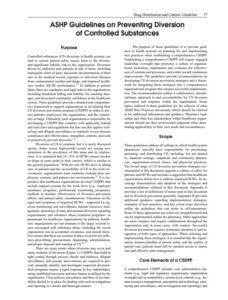 Controlled substances (CS) diversion in health systems can lead to serious patient safety issues, harm to the diverter, and significant liability risk to the organization. Diversion driven by addiction puts patients at risk of harm, including inadequate relief of pain, inaccurate documentation of their care in the medical record, exposure to infectious diseases from contaminated needles and drugs, and impaired healthcare worker (HCW) performance. In addition to patient harm, there are regulatory and legal risks to the organization, including fraudulent billing and liability for resulting damages, and decreased community confidence in the healthcare system. These guidelines provide a detailed and comprehensive framework to support organizations in developing their CS diversion prevention program (CSDPP) in order to protect patients, employees, the organization, and the community-at-large. Ultimately, each organization is responsible for developing a CSDPP that complies with applicable federal and state laws and regulations but also one that applies technology and diligent surveillance to routinely review process compliance and effectiveness, strengthen controls, and seek to proactively prevent diversion.
Controlled substances (CS) diversion in health systems can lead to serious patient safety issues, harm to the diverter, and significant liability risk to the organization. Diversion driven by addiction puts patients at risk of harm, including inadequate relief of pain, inaccurate documentation of their care in the medical record, exposure to infectious diseases from contaminated needles and drugs, and impaired healthcare worker (HCW) performance. In addition to patient harm, there are regulatory and legal risks to the organization, including fraudulent billing and liability for resulting damages, and decreased community confidence in the healthcare system. These guidelines provide a detailed and comprehensive framework to support organizations in developing their CS diversion prevention program (CSDPP) in order to protect patients, employees, the organization, and the community-at-large. Ultimately, each organization is responsible for developing a CSDPP that complies with applicable federal and state laws and regulations but also one that applies technology and diligent surveillance to routinely review process compliance and effectiveness, strengthen controls, and seek to proactively prevent diversion.


